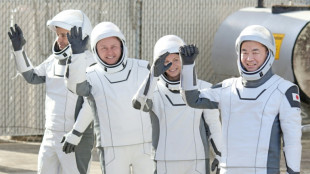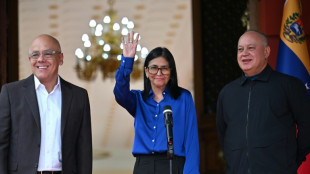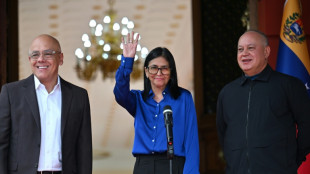
-
 Spanish singer Julio Iglesias prepares defence against abuse allegations: Hola! magazine
Spanish singer Julio Iglesias prepares defence against abuse allegations: Hola! magazine
-
Actor McConaughey seeks to patent image to protect from AI

-
 Musk's Grok barred from undressing images after global backlash
Musk's Grok barred from undressing images after global backlash
-
Hosts Morocco set up Senegal AFCON final showdown

-
 Trump says Iran killings stopped, Tehran says 'no plan for hanging'
Trump says Iran killings stopped, Tehran says 'no plan for hanging'
-
Chelsea paid for costly errors in Arsenal defeat, says Rosenior

-
 Morocco beat Nigeria on penalties to reach Africa Cup of Nations final
Morocco beat Nigeria on penalties to reach Africa Cup of Nations final
-
Golden Globes viewership shrinks again

-
 Astronauts leave ISS in first-ever medical evacuation
Astronauts leave ISS in first-ever medical evacuation
-
NASA reports record heat but omits reference to climate change

-
 Trump praises 'terrific' new Venezuela leader after call
Trump praises 'terrific' new Venezuela leader after call
-
Real Madrid crash out of Copa del Rey at Albacete on Arbeloa debut

-
 Trump says Iran killings stopped as US scales back Qatar base
Trump says Iran killings stopped as US scales back Qatar base
-
Arsenal beat Rosenior's Chelsea in League Cup semi first leg

-
 US stocks fall again as Iran worries lift oil prices
US stocks fall again as Iran worries lift oil prices
-
Inter extend Serie A lead to six points after Napoli slip

-
 Bayern beat Cologne to move 11 points clear in Bundesliga
Bayern beat Cologne to move 11 points clear in Bundesliga
-
Mane takes Senegal past Egypt into final of his last AFCON

-
 Trump says Greenland will 'work out' after Denmark fails to bridge gap
Trump says Greenland will 'work out' after Denmark fails to bridge gap
-
'Bridgerton' premieres in Paris promising 'Cinderella with a twist'

-
 California begins probe of Musk's Grok over sexualized AI images
California begins probe of Musk's Grok over sexualized AI images
-
Astronauts set to leave ISS in first-ever medical evacuation

-
 Napoli's stalemate with Parma opens door for Serie A leaders Inter
Napoli's stalemate with Parma opens door for Serie A leaders Inter
-
Syrian leader urges Kurdish integration as army sends troops east of Aleppo

-
 Denmark says White House talks failed to alter US designs on Greenland
Denmark says White House talks failed to alter US designs on Greenland
-
Venezuela looking to 'new era' after Maduro ouster, says interim leader

-
 Mane takes dominant Senegal past Egypt into AFCON final
Mane takes dominant Senegal past Egypt into AFCON final
-
UK police admit 'mistakes' over Maccabi Tel Aviv fan ban

-
 Promoter says Joshua will return to ring when 'time is right' after horror crash
Promoter says Joshua will return to ring when 'time is right' after horror crash
-
California investigating Grok AI over lewd fake images

-
 Wales's Faletau set to miss bulk of Six Nations
Wales's Faletau set to miss bulk of Six Nations
-
Denmark, Greenland wrap up crunch White House talks

-
 England sweating on Fin Smith's fitness for Six Nations opener
England sweating on Fin Smith's fitness for Six Nations opener
-
NASA acknowledges record heat but avoids referencing climate change

-
 England rugby league coach Wane quits role
England rugby league coach Wane quits role
-
Oil prices extend gains on Iran worries

-
 European basketball pioneer Schrempf lauds 'global' NBA
European basketball pioneer Schrempf lauds 'global' NBA
-
Denmark, Greenland in crunch White House talks as Trump ups pressure

-
 Mitchell hits ton as New Zealand down India to level ODI series
Mitchell hits ton as New Zealand down India to level ODI series
-
Syrian army tells civilians to stay away from Kurdish positions east of Aleppo

-
 Spurs sign England midfielder Gallagher from Atletico Madrid
Spurs sign England midfielder Gallagher from Atletico Madrid
-
Russian captain tried to avoid North Sea crash: court

-
 Battle over Chinese-owned chipmaker Nexperia rages in Dutch court
Battle over Chinese-owned chipmaker Nexperia rages in Dutch court
-
Transatlantic ties 'disintegrating': German vice chancellor

-
 Five problems facing Ukraine's new defence chief
Five problems facing Ukraine's new defence chief
-
Italian influencer Ferragni acquitted in Christmas cake fraud trial

-
 UK interior minister says 'lost confidence' in police chief over Maccabi fan ban
UK interior minister says 'lost confidence' in police chief over Maccabi fan ban
-
Ryanair hits out at 'stupid' Belgium over aviation taxes

-
 Burkina Faso sack coach Traore after AFCON exit
Burkina Faso sack coach Traore after AFCON exit
-
African manufacturers welcome US trade deal, call to finalise it


At San Francisco expo, AI 'sorry' for destroying humanity
Advances in artificial intelligence are coming so hard and fast that a museum in San Francisco, the beating heart of the tech revolution, has imagined a memorial to the demise of humanity.
"Sorry for killing most of humanity person with smile cap and mustache," says a monitor welcoming a visitor to the "Misalignment Museum," a new exhibit on the controversial technology.
The pieces in this temporary show mix the disturbing with the comic, and this first display has AI disburse pithy observations to the visitors that cross into its line of vision.
"The concept of the museum is that we are in a post-apocalyptic world where artificial general intelligence has already destroyed most of humanity," said Audrey Kim, the show's curator.
"But then the AI realizes that was bad and creates a type of memorial to the human, so our show's tagline is 'sorry for killing most of humanity,'" she said.
Artificial General Intelligence is a concept that is even more nebulous than the simple AI that is cascading into everyday life, as seen in the fast emergence of apps such as ChatGPT or Bing's chatbot and all the hype surrounding them.
AGI is "artificial intelligence that is able to do anything that a human would be able to do," integrating human cognitive capacities into machines.
All around San Francisco, and down the peninsula in Silicon Valley, startups are hot on the trail of the AGI holy grail.
Sam Altman, the founder of ChatGPT creator OpenAI, has said AGI, done right, can "elevate humanity" and change the "limits of possibilities."
- Paperclip AI -
But Kim wants to trigger a reflection on the dangers of going too far, too quickly.
"There have been lots of conversations about the safety of AI in pretty niche intellectual tech circles on Twitter and I think that's very important," she said.
But those conversations are not as easily accessible to the general public as concepts that you can see or feel, she added.
Kim is particularly fond of a sculpture called "Paperclip Embrace": two busts of humans holding each other, made entirely of paperclips.
The work refers to a metaphor by philosopher Nick Bostrom, who in the 2000s imagined what would happen if artificial intelligence was programmed to create paper clips.
"It could become more and more powerful, and constantly optimize itself to achieve its one and only goal, to the point of destroying all of humanity in order to flood the world with paper clips," Kim said.
Weighing the pros and cons of AI is a subject that became close to Kim's heart in an earlier job working for Cruise, an autonomous vehicle company.
There she worked on an "incredible" technology, which "could reduce the number of accidents due to human error," but also presented risks, she said.
The exhibit occupies a small space in a street corner building in San Francisco's hip Mission neighborhood.
The lower floor of the exhibition is dedicated to AI as a nightmarish dystopia where a machine powered by GPT-3, the language model behind ChatGPT, composes spiteful calligrams against humanity, in cursive writing.
One exhibit is an AI-generated -- and totally fake -- dialogue between the philosopher Slavoj Zizek and the filmmaker Werner Herzog, two of Europe's most respected intellectuals.
This "Infinite Conversation" is a meditation on deep fakes: images, sound or video that aim to manipulate opinion by impersonating real people and that have become the latest disinformation weapon online.
"We only started this project five months ago, and yet many of the technologies presented here already seem almost primitive," Kim said, astonished.
She hopes to turn the exhibit into a permanent one with more space and more events.
S.Abdullah--SF-PST



